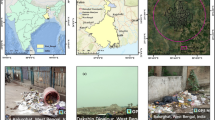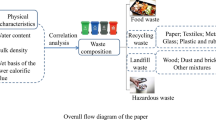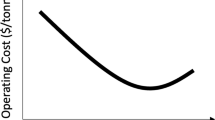Abstract
An appropriate and sustainable waste management plan is required in different scenarios for global development. The main goal of this paper is to evaluate a waste management problem by investigating an integrated multi-objective environment through solid transportation problem. To develop sustainability, three objective functions are optimized by choosing as cost for economical opportunity, time for social satisfaction and carbon emission for environmental view. Cap and trade policy is regarded here to minimize carbon emission and to provide some economical opportunities to the system. To control hesitancy of this scenario, twofold uncertainty (type-2 intuitionistic fuzzy) is incorporated here, and this uncertainty is defuzzified by a ranking operator. A strategy is proposed here to optimize three factors of sustainability by an intellectual model formulation of solid waste management. To check the appropriateness of the proposed model, two numerical problems are evaluated using two advanced methods, namely, neutrosophic linear programming and \(\epsilon \)-constraint method. The Pareto-optimal solutions are derived by the variation of cap value and fulfilling the criteria of sustainability. The obtained results indicate that cap and trade policy or waste management, or both are highly sophisticated for applying in real-world application. The overall conclusions recommend that a government or NGO should encourage transportation system, or the industry to minimize carbon emission by utilizing several carbon policies. It can assist to establish different new project of waste management in a discrete environment, based on sustainability.









Similar content being viewed by others
References
Abdullah, L., & Goh, P. (2019). Decision making method based on Pythagorean fuzzy sets and its application to solid waste management. Complex and Intelligent Systems, 5, 185–198.
Atanassov, K. (1986). Intuitionistic fuzzy sets. Fuzzy Sets and Systems, 20, 87–96.
Bai, Q., Xu, J., & Zhang, Y. (2022). The distributionally robust optimization model for a remanufacturing system under cap-and-trade policy: A newsvendor approach. Annals of Operations Research, 309(2), 731–760.
Bektur, G. (2020). An integrated methodology for the selection of sustainable suppliers and order allocation problem with quantity discounts, lost sales and varying supplier availabilities. Sustainable Production and Consumption, 23, 111–127.
Brundtland, G. H., Khalid, M., Agnelli, S., Al-Athel, S., & Chidzero, B. (1987). Our common future (p. 8). Brundtland Report.
Chen, P., Vivian, A., & Ye, C. (2022). Forecasting carbon futures price: A hybrid method incorporating fuzzy entropy and extreme learning machine. Annals of Operations Research, 313(1), 559–601.
Das, S. K., & Roy, S. K. (2019). Effect of variable carbon emission in a multi-objective transportation-p-facility location problem under neutrosophic environment. Computers and Industrial Engineering, 132, 311–324.
Farrokhi-Asl, H., Makui, A., Jabbarzadeh, A., & Barzinpour, F. (2020). Solving a multi-objective sustainable waste collection problem considering a new collection network. Operational Research, 20, 1977–2015.
Ghosh, S., Küfer, K.-H., Roy, S. K., & Weber, G.-W. (2022). Carbon mechanism on sustainable multi-objective solid transportation problem for waste management in Pythagorean hesitant fuzzy environment. Complex and Intelligent Systems, 8(5), 4115–4143.
Ghosh, S., Roy, S. K., Ebrahimnejad, A., & Verdegay, J. L. (2021). Multi-objective fully intuitionistic fuzzy fixed-charge solid transportation problem. Complex and Intelligent Systems, 7, 1009–1023.
Haimes, Y. (1971). On a bicriterion formulation of the problems of integrated system identification and system optimization. IEEE Transactions on Systems, Man, and Cybernetics, 3, 296–297.
Haley, K. (1962). The solid transportation problem problem. Operations Research, 10(4), 448–463.
Hitchcock, F. L. (1941). The distribution of a product from several sources to numerous localities. Journal of Mathematics and Physics, 20(1–4), 224–230.
Kilic, H. S., & Yalcin, A. S. (2021). Comparison of municipalities considering environmental sustainability via neutrosophic DEMATEL based TOPSIS. Socio-Economic Planning Sciences, 75, 100827.
Li, D.-F. (2014). Decision and game theory in management with intuitionistic fuzzy sets. Studied in fuzziness and soft computing (Vol. 308, pp. 1–459). Springer.
Liuzzi, D., Lupi, V., & Vié, A. (2022). Sustainability, cooperation and mobility of workers within and between European countries: A two-stage goal programming model. Annals of Operations Research, 311(1), 1–21.
Mahmoudsoltani, F., Shahbandarzadeh, H., & Moghdani, R. (2018). Using pareto-based multi-objective evolution algorithms in decision structure to transfer the hazardous materials to safety storage centre. Journal of Cleaner Production, 184, 893–911.
Maity, G., Roy, S. K., & Verdegay, J. L. (2019). Time variant multi-objective interval-valued transportation problem in sustainable development. Sustainability, 11(21), 6161.
Mehlawat, M. K., Kannan, D., Gupta, P., & Aggarwal, U. (2019). Sustainable transportation planning for a three-stage fixed charge multi-objective transportation problem. Annals of Operations Research. https://doi.org/10.1007/s10479-019-03451-4
Mendel, J. M., & John, R. B. (2002). Type-2 fuzzy sets made simple. IEEE Transactions on Fuzzy Systems, 10(2), 117–127.
Midya, S., Roy, S. K., & Yu, V. F. (2021). Intuitionistic fuzzy multi-stage multi-objective fixed-charge solid transportation problem in a green supply chain. International Journal of Machine Learning and Cybernetics, 12, 699–717.
Mingaleva, Z., Vukovic, N., Volkova, I., & Salimova, T. (2019). Waste management in green and smart cities: A case study of Russia. Sustainability, 12(1), 94.
Mondal, A., Roy, S. K., & Midya, S. (2021). Intuitionistic fuzzy sustainable multi-objective multi-item multi-choice step fixed-charge solid transportation problem. Journal of Ambient Intelligence and Humanized Computing. https://doi.org/10.1007/s12652-021-03554-6
Muneeb, S. M., Adhami, A. Y., Jalil, S. A., & Asim, Z. (2018). Decentralized bi-level decision planning model for municipal solid waste recycling and management with cost reliability under uncertain environment. Sustainable Production and Consumption, 16, 33–44.
Paul, A., Pervin, M., Roy, S. K., Maculan, N., & Weber, G.-W. (2022). A green inventory model with the effect of carbon taxation. Annals of Operations Research, 309(1), 233–248.
Rabbani, M., Heidari, R., Farrokhi-Asl, H., & Rahimi, N. (2018). Using metaheuristic algorithms to solve a multi-objective industrial hazardous waste location-routing problem considering incompatible waste types. Journal of Cleaner Production, 170, 227–241.
Rathore, P., & Sarmah, S. (2019). Modeling transfer station locations considering source separation of solid waste in urban centers: A case study of Bilaspur City, India. Journal of Cleaner Production, 211, 44–60.
Reza-Gharehbagh, R., Arisian, S., Hafezalkotob, A., & Makui, A. (2022). Sustainable supply chain finance through digital platforms: A pathway to green entrepreneurship. Annals of Operations Research. https://doi.org/10.1007/s10479-022-04623-5
Rizk-Allah, R. M., Hassanien, A. E., & Elhoseny, M. (2018). A multi-objective transportation model under neutrosophic environment. Computers and Electrical Engineering, 69, 705–719.
Roy, S. K., & Bhaumik, A. (2018). Intelligent water management: A triangular type-2 intuitionistic fuzzy matrix games approach. Water Resources Management, 32, 949–968.
Roy, S. K., Ebrahimnejad, A., Verdegay, J. L., & Das, S. (2018). New approach for solving intuitionistic fuzzy multi-objective transportation problem. Sādhanā, 43, 1–12.
Sherafati, M., Bashiri, M., Tavakkoli-Moghaddam, R., & Pishvaee, M. S. (2019). Supply chain network design considering sustainable development paradigm: A case study in cable industry. Journal of Cleaner Production, 234, 366–380.
Smarandache, F. (1999). A unifying field in logics. Neutrosophy: Neutrosophic probability, set and logic. American Research Press.
Soleimani, H., Chhetri, P., Fathollahi-Fard, A. M., Hashem, M. A., & Shahparvari, S. (2022). Sustainable closed-loop supply chain with energy efficiency: Lagrangian relaxation, reformulations and heuristics. Annals of Operations Research, 318(1), 531–556.
Tirkolaee, E. B., Goli, A., Gütmen, S., Weber, G.-W., & Szwedzka, K. (2022). A novel model for sustainable waste collection arc routing problem: Pareto-based algorithms. Annals of Operations Research, 1, 26. https://doi.org/10.1007/s10479-022-04557-y
Tirkolaee, E. B., Mahdavi, I., Seyyed Esfahani, M. M., & Weber, G.-W. (2020a). A hybrid augmented ant colony optimization for the multi-trip capacitated arc routing problem under fuzzy demands for urban solid waste management. Waste Management and Research, 38(2), 156–172.
Tirkolaee, E. B., Mahdavi, I., Esfahani, M. M. S., & Weber, G.-W. (2020b). A robust green location-allocation-inventory problem to design an urban waste management system under uncertainty. Waste Management, 102, 340–350.
Tsai, W.-H., Lai, S.-Y., & Hsieh, C.-L. (2022). Exploring the impact of different carbon emission cost models on corporate profitability. Annals of Operations Research. https://doi.org/10.1007/s10479-022-04519-4
Vafaei, A., Yaghoubi, S., Tajik, J., & Barzinpour, F. (2020). Designing a sustainable multi-channel supply chain distribution network: A case study. Journal of Cleaner Production, 251, 119628.
Xu, Z., Elomri, A., Pokharel, S., Zhang, Q., Ming, X., & Liu, W. (2017). Global reverse supply chain design for solid waste recycling under uncertainties and carbon emission constraint. Waste Management, 64, 358–370.
Xu, Z., Pokharel, S., & Elomri, A. (2022). An eco-friendly closed-loop supply chain facing demand and carbon price uncertainty. Annals of Operations Research. https://doi.org/10.1007/s10479-021-04499-x
Ye, J. (2018). Neutrosophic number linear programming method and its application under neutrosophic number environments. Soft Computing, 22, 4639–4646.
Zadeh, L. A. (1965). Fuzzy sets. Information and Control, 8(3), 338–353.
Zhen, L., Huang, L., & Wang, W. (2019). Green and sustainable closed-loop supply chain network design under uncertainty. Journal of Cleaner Production, 227, 1195–1209.
Acknowledgements
The authors are very much grateful to the Editor-in-Chief and anonymous reviewers for their intelligent comments that helped too much for improving the manuscript and to maintain the quality of the manuscript.
Author information
Authors and Affiliations
Corresponding author
Ethics declarations
Conflict of interest
Authors announce that there is no conflict of interest.
Data availability statement
All data utilized for supporting the findings of this study.
Additional information
Publisher's Note
Springer Nature remains neutral with regard to jurisdictional claims in published maps and institutional affiliations.
Rights and permissions
Springer Nature or its licensor (e.g. a society or other partner) holds exclusive rights to this article under a publishing agreement with the author(s) or other rightsholder(s); author self-archiving of the accepted manuscript version of this article is solely governed by the terms of such publishing agreement and applicable law.
About this article
Cite this article
Ghosh, S., Roy, S.K. & Weber, GW. Interactive strategy of carbon cap-and-trade policy on sustainable multi-objective solid transportation problem with twofold uncertain waste management. Ann Oper Res 326, 157–197 (2023). https://doi.org/10.1007/s10479-023-05347-w
Accepted:
Published:
Issue Date:
DOI: https://doi.org/10.1007/s10479-023-05347-w
Keywords
- Waste management
- Multi-objective decision making
- Sustainability
- Solid transportation problem
- Cap-and-trade policy
- Type-2 intuitionistic fuzzy
- Neutrosophic linear programming and \(\epsilon \)-Constraint method




